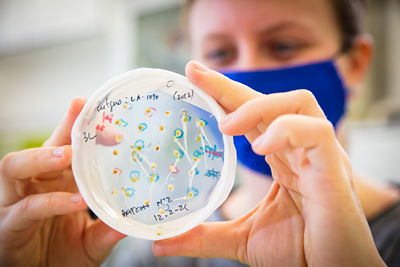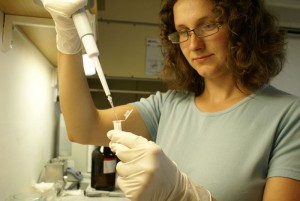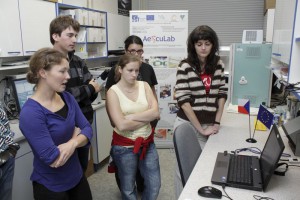 Laboratory of Growth Regulators has been created in 1996 as a joint facility of the Faculty of Science, Palacký University (PU) and the Institute of Experimental Botany, Czech Academy of Sciences (IEB CAS).
Laboratory of Growth Regulators has been created in 1996 as a joint facility of the Faculty of Science, Palacký University (PU) and the Institute of Experimental Botany, Czech Academy of Sciences (IEB CAS).
Researchers at the LGR deal mainly with cytokinins, but recently also with other groups of plant growth regulators. The phytohormones cytokinins promote cell division, or cytokinesis, in plant roots and shoots. They are involved primarily in cell growth and differentiation but they also affect apical dominance, axillary bud growth, and leaf senescence. These hormones are present in very low concentrations in plant cells. One globally renowned contribution of the LGR in this field is the expansion of a number of cytokinins, especially the aromatic cytokinins and their olomoucine-derived derivatives. These compounds are used in cancer treatment. Olomoucine was the first in a line of anti-tumor agents derived from cytokinins. Development of other, more effective inhibitors of cyclin-dependent kinases, key enzymes of cell division cycle like bohemine, roscovitine, olomoucine II and others followed. Roscovitine was licensed by Cyclacel Pharmaceuticals, Inc. (for more information see actual Press Release) and under its commercial name, Seliciclib® is completing phase II clinical trials for cancer treatment in Europe and in the USA. However, the development of anti-cancer drugs is not the only field that the LGR deals with. It is also successful in the agricultural research area. For example, we discovered how to increase the amount of endogenous cytokinins using an inhibitor of cytokinin oxidase/dehydrogenase called INCIDE, which supports growth. Owing to this discovery, we were able to increase the yield of a number of agricultural crops and plant stress resistance. Recently, we developed a product which makes the skin youthful aids in the treatment of skin diseases. Cytokinins, which also retard ageing in humans were used in this development. Two international patents were issued for these discoveries. These were licensed to the American company Pyratine Plc in California which incurred the costs for patent protection. The product with the trade name Pyratine is derived from cytokinins. It was introduced onto the market two years ago. This not only treats skin roughness, wrinkles, and pigmentation, it is also effective for treating various forms of acne. LGR publishes in prestigious international journals and submits a number of applications for international patents annually. The purpose of this laboratory is to integrate the problem solving of scientific research projects in the field of molecular and physiological mechanisms of the effects of growth regulators in living organisms. LGR focuses on scientific research and teaching in the field of experimental biology, especially in the preparation of new, purine-based growth regulators with potent biological activities, the development of relevant analytical methods, the study of the functions and effects on growth and developmental process in normal and tumor cells, including the development of anti-tumor agents derived from plant hormones. Research on tumor suppressor genes, mechanisms that regulate their expression and the development of mutant organisms with controlled gene expression, are included in our scientific profile. LGR also cooperates in these fields with a number of research groups in the Czech Republic as well as internationally. Within the IEB CAS).Since 2014, the LGR has been involved in the research of the Centre of the Region Haná for Biotechnological and Agricultural Research).
 Our multidisciplinary research team is composed of experienced plant physiologists and biochemists, as well as organic and analytical chemists. Many students are involved in the research during their undergraduate and postgraduate studies in Experimental Biology, Botany, Analytical Chemistry, Organic Chemistry, Biochemistry and Molecular and Cellular Biology.
Our multidisciplinary research team is composed of experienced plant physiologists and biochemists, as well as organic and analytical chemists. Many students are involved in the research during their undergraduate and postgraduate studies in Experimental Biology, Botany, Analytical Chemistry, Organic Chemistry, Biochemistry and Molecular and Cellular Biology.
Members of the laboratory give lectures in, for example, general botany, plant physiology, microbiology, chemistry, and molecular biology, etc. Teaching includes practical courses and seminars in different subjects (section Teaching).
LGR guarantees the teaching for biological study programs, including newly established bachelor and magister courses of “Experimental Biology”. The three year Master study programme covers rapidly developing biological and medicinal disciplines, with a strong orientation towards practical applications. It equips students with broad biological knowledge, combined with a clear focus on modern experimental methods and approaches in biology and biomedicine. Graduates acquire the expertise, technical competence and experimental skills required for subsequent work in diverse settings, including: fundamental and applied research institutes, biological and medicinal laboratories, food and pharmaceutical industries, agriculture, sanitation, and biotechnological companies.
 The “Experimental Biology” Master study programme focuses on biochemical and biological processes, particularly advanced experimental strategies, methods and technologies for their molecular and cellular level analysis. It provides students with broad biological and medicinal knowledge together with focused expertise in modern biological, biotechnological and biomedical experimental procedures. The students are equipped to work not only as independent scientists or research workers, but also as leaders of scientific and management teams. The curriculum includes all the specialised courses required to equip graduates with the laboratory skills and methodological expertise required (according to act N. 96/2004 Sb.) for employment in medical facilities.
The “Experimental Biology” Master study programme focuses on biochemical and biological processes, particularly advanced experimental strategies, methods and technologies for their molecular and cellular level analysis. It provides students with broad biological and medicinal knowledge together with focused expertise in modern biological, biotechnological and biomedical experimental procedures. The students are equipped to work not only as independent scientists or research workers, but also as leaders of scientific and management teams. The curriculum includes all the specialised courses required to equip graduates with the laboratory skills and methodological expertise required (according to act N. 96/2004 Sb.) for employment in medical facilities.
 Laboratory of Growth Regulators
Palacký University Olomouc
Laboratory of Growth Regulators
Palacký University Olomouc